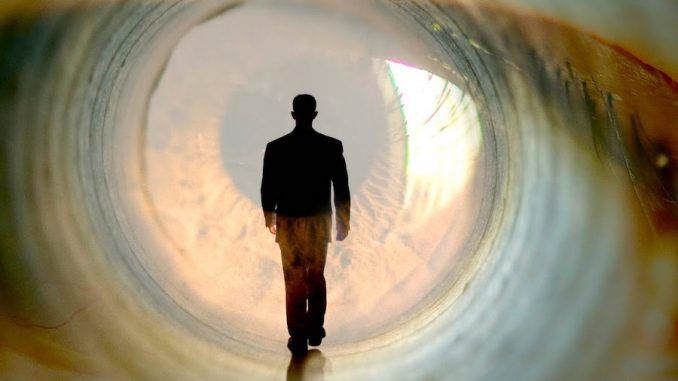
British and German scientists have confirmed there is some form of life after death. The astonishing conclusion is based on the results of two separate European studies using a new type of medically supervised near-death experience that allows patients to be “clinically dead” for almost 20 minutes before being brought back to life.
In the British study – a large scale research project involving more than 2,000 people – scientists confirmed that consciousness does carry on after the heart stops. It had been believed the brain stopped all activity 30 seconds after the heart had stopped pumping blood around the body, and that with that, awareness ceases too.
But the shock research from the University of Southampton proved “clinically dead” people continue having thoughts — and also uncovered the most convincing scientific evidence yet that “out of body” experiences are real.

BYPASS THE CENSORS
Sign up to get unfiltered news delivered straight to your inbox.
You can unsubscribe any time. By subscribing you agree to our Terms of Use
Lead researcher Dr Sam Parnia said: “Contrary to perception, death is not a specific moment but a potentially reversible process that occurs after any severe illness or accident causes the heart, lungs and brain to cease functioning. If attempts are made to reverse this process, it is referred to as ‘cardiac arrest’; however, if these attempts do not succeed it is called ‘death’.”
Of the 2,060 patients from Austria, the US and the UK interviewed for the study who had survived cardiac arrest, almost 40 per cent said that they recall some form of awareness after being pronounced clinically dead. Dr Parnia continued: “This suggests more people may have mental activity initially but then lose their memories after recovery, either due to the effects of brain injury or sedative drugs on memory recall.”
Perhaps the most significant finding of the British study is that of a 57-year old man who is the first scientifically confirmed “out of body” experience in a patient. The man was able to recall with eerie accuracy what was going on around him after he had “died” temporarily. Dr Parnia continued: “This is significant, since it has often been assumed that experiences in relation to death are likely hallucinations or illusions occurring either before the heart stops or after the heart has been successfully restarted, but not an experience corresponding with ‘real’ events when the heart isn’t beating. In this case, consciousness and awareness appeared to occur during a three-minute period when there was no heartbeat.”
The British study was published in the journal Resuscitation and are now available online — and it’s conclusions are supported by a concurrent German study from the Technische Universität of Berlin.
The German study involved medically-supervised near death experiences undertaken by 944 volunteers over that last four years, and used a complex mixture of drugs including epinephrine and dimethyltryptamine to allow the body to survive the state of “clinical death” and be reanimated without damage.
The volunteer subjects were put into temporary comatic states induced by a mixture of other drugs which had to be filtered by ozone during the reanimation process 18 minutes later.
The team of scientists, led by Dr Berthold Ackermann, monitored the operations and compiled testimonies of the subjects. Although there are some slight variations from one individual to another, all of the subjects have some memories of their period of clinical death — and a vast majority of them described very similar sensations.
“Most common memories include a feeling of detachment from the body, feelings of levitation, total serenity, security, warmth, the experience of absolute dissolution, and the presence of an overwhelming light.”
The scientists say that they are well aware that many of their conclusions could shock a lot of people. Mr Ackermann said the religious beliefs of the various subjects seems to have made no difference at all regarding the sensations and experiences that subjects described at the end of the experiment. The volunteers included members of various Christian denominations, Muslims, Jews, Hindus and atheists.
“I know our results could disturb the beliefs of many people” says Mr Ackermann. “But in a way, we have just answered one of the greatest questions in the history of mankind, so I hope these people will be able to forgive us. Yes, there is life after death and it looks like this applies to everyone.”


